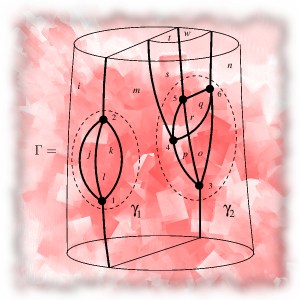
Exact Results in Quantum Theory & Gravity
Ścisłe rezultaty teorii kwantów i grawitacji
2021/2022
prof. dr hab. Jan Dereziński, prof. dr hab. Krzysztof Meissner
dr Wojciech Kamiński, dr Grzegorz Łach
Pasteura 5, room 1.40, Fridays 14:15 - < 16:00
 |
Exact Results in Quantum Theory & GravityŚcisłe rezultaty teorii kwantów i grawitacji2021/2022prof. dr hab. Jan Dereziński, prof. dr hab. Krzysztof Meissner dr Wojciech Kamiński, dr Grzegorz Łach Pasteura 5, room 1.40, Fridays 14:15 - < 16:00 |
Abstract:
World lines of particles that exchange in 2D form braids in spacetime. These braids are subject to certain universal topological relations coming from their continuous
deformations. In 2D, such an approach leads to the well-known braiding relation also known as the Yang-Baxter relation. In my talk, I will show how to define counterparts
of braids and derive braiding relations for particles constrained to move on planar wire networks. In particular, I will demonstrate that particles on wire networks have
fundamentally different braiding properties than particles in 2D. My analysis reveals an unexpectedly wide variety of possible non-abelian braiding behaviours on networks.
The character of braiding depends on the topological invariant called the connectedness of the network. As one of our most striking consequences, particles on modular
networks can change their statistical properties when moving between different modules. However, sufficiently highly connected networks already reproduce braiding
properties of 2D systems.
In the second part of my talk, I will analyse the ways of realising the braiding of anyons on networks in a topological quantum field theory setting where anyons are
allowed to braid as well as fuse. The compatibility of fusion and braiding on networks leads to new types of hexagon equations which in turn allow more general braid
actions than the ones which are known from 2D physics.
[1] BH An, T Maciazek, Geometric presentations of braid groups for particles on a graph, Comm. Math. Phys. 384 (2) (2021)
[2] T Maciazek, BH An, Universal properties of anyon braiding on one-dimensional wire networks, Physical Review B 102 (20), 201407 (2020)
[3] A Conlon, J K Slingerland, Compatibility of Braiding and Fusion on Wire Networks, arXiv:2202.08207 (2022)
Link:
https://us02web.zoom.us/j/84029651999?pwd=7tmWZrP9H5XKSwgebUoTESarH5tnjj.1
| Date | Speaker | Title | Slides |
|---|---|---|---|
| 08.10.2021 | Krzysztof Byczuk (IFT) | Basic definition of superconductors | |
| 15.10.2021 | Błażej Ruba (UJ) | Dirac-Coulomb Hamiltonians (at 17:00 CET [!]) | |
| 22.10.2021 | Piotr Kucharski (Caltech) | Knots, quivers, and quantum field theory | |
| 29.10.2021 | Nick Manton (DAMTP, Cambridge) | Skyrmions, Topology and Instantons (joint seminar with UJ and UAM) | |
| 05.11.2021 | Joseph Schindler (UCSC) | The statistical mechanical entropy of quantum correlations | |
| 19.11.2021 | Yoh Tanimoto (Tor Vergata) | Local energy bounds and strong locality in chiral
CFT (at 17:00 [!], joint seminar with UAM and UJ) | |
| 26.11.2021 | Bogdan Damski (IFT UJ) | Angular momentum of the electron in covariantly quantized
electrodynamics | |
| 03.12.2021 | Miłosz Panfil (IFT) | Local density approximation in cold atomic gases | |
| 10.12.2021 | Jacek Wojtkiewicz (KMMF) Piotr Chankowski (IFT) | Dilute Interacting Fermions by Effective Field Theory | |
| 17.12.2021 | Adam Bzowski (IFT) | Breaking the spell of the tensor product | |
| 14.01.2022 | Wojciech Kamiński (IFT) | Quantum stress energy tensor | |
| 21.01.2022 (on-line) | Alexander Stottmeister (University of Hannover) | Towards the quantum scaling limit of the Ising
model (joint seminar with UAM and UJ) | |
| 28.01.2022 | Jan Kwapisz (IFT) | Renormalization group techniques: perturbative and the
Wilsonian viewpoint | |
| 28.01.2022 (on-line 17:00) | Jonathan Stanfill (Baylor University) | Spectral zeta functions and zeta regularized functional determinants for singular Sturm-Liouville operators | |
| 04.03.2022 (on-line 17:00) | Joseph Schindler (UCSC) | Penrose diagrams for explicit models of black hole evaporation | |
| 11.03.2022 (on-line, 14:15) | Paweł Duch (Universität Leipzig) | Infrared problem in relativistic QED | |
| 18.03.2022 (on-line, 14:15) | Bilal Cantürk (Sabanci University) | Generalizing the quantification of information | |
| 25.03.2022 (B2.38, 14:15) | Christian Gass (Universität Götingen) | Constructive aspects of string-localized quantum field theory | |
| 01.04.2022 (1.40, 14:15) | Paweł Zin | Non-existence of causal classical electrodynamics of point charged particles | |
| 08.04.2022 (1.40, 14:15) | Flavio Nogueira (IFW Dresden) | Bosonization duality in 2+1 dimensions and deconfined
quantum critical points | |
| 22.04.2022 (1.40, 14:15) | Jerzy Lewandowski (IFT) | BMS like symmetries of non-expanding horizons, corresponding
charges and fluxes. | |
| 25.04.2022 (Mon) (on-line, 14:00) | Alexander Efremov | Renormalization of SU(2) Yang-Mills theory with the flow equations | |
| 29.04.2022 (on-line, 14:15) | Paolo Meda | Semiclassical Gravity in Cosmology and Black Hole Physics | |
| 29.04.2022 (on-line, 16:00) | Elek Csobo (U. Innsbruck) | On blowup for the energy supercritical quadratic wave equation | |
| 13.05.2022 | Xiaoxu Wu (Rutgers University) | Large time asymptotics of Schrödinger type equations with general data | |
| 20.05.2022 | Jacek Pawełczyk (IFT) | Three derivations of critical dimension in string theory | |
| 27.05.2022 | Tomasz Cieślak (IMPAN) | Prandtl spirals as solutions to the 2d Euler | |
| 03.06.2022 | Zoran Ristivojevic (CNRS) | Several new exact results for the Lieb-Liniger model | |
| 10.06.2022 | Maciej Kolanowski (IFT) | A pancaked IR: novel fixed points for four-dimensional holographic theories | |
| 24.06.2022 (on-line, 14:15) | Tomasz Maciażek (U. Bristol) | Non-abelian quantum statistics on 1D wire networks |